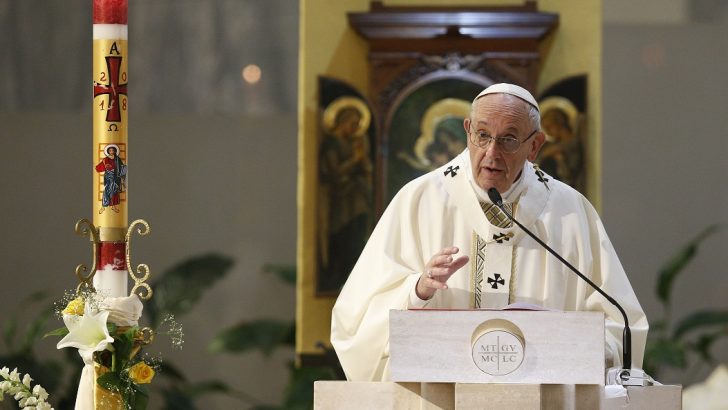Hannah Brockhaus
People need the mercy of God and the healing of the Holy Spirit to root out the sin in their lives – they cannot do it on their own, Pope Francis said at the general audience today.
“It is useless to think of being able to correct oneself without the gift of the Holy Spirit. It is futile to think of purifying our heart in a titanic effort of only our will. This is not possible,” he said.
“We must open ourselves to relationship with God, in truth and in freedom,” he urged, “only in this way can our labours bear fruit. Because it is the Holy Spirit that carries us forward.”
Before the start of the general audience, the Pope greeted and blessed an ill woman, who was brought to the square by her family, and accompanied by medical personnel.
In his catechesis, he reflected on the tenth commandment, which says to not covet the house or wife or goods of one’s neighbour. In a way, this commandment sounds like the commandments against stealing and against adultery, Francis pointed out.
“Keep in mind,” he said, “that all the commandments have the task of indicating the boundary of life, the limit beyond which man destroys himself and his neighbour, spoiling his relationship with God.”
He explained that the Ten Commandments signal the behaviour and actions which will destroy one’s self and destroy one’s relationship with God and with others, and said in the tenth and final commandment, it is emphasised that all sin comes from a common root: “evil desires”.
Quoting Jesus in the Gospel of Mark, Francis said: “From within, in fact, from the heart of men, come evil purposes: impurity, theft, murder, adultery, greed, malice, deceit, licentiousness, envy, blasphemy, pride, foolishness.”
“A good list, huh?” he commented off-the-cuff, saying he would reread it, “because it will be good for everyone”.
To try to follow the Ten Commandments, therefore, is useless, the Pope said, if not accompanied by the desire to also be rid of the evil desires hiding within the heart.
“The last words of the Decalogue educate everyone to recognise themselves as beggars,” he said. “They help us to face the disorder of our heart, to stop living selfishly and become poor in spirit, authentic in the presence of the Father, allowing ourselves to be redeemed by the Son and taught by the Holy Spirit.”
Catholic News Agency (CNA)



